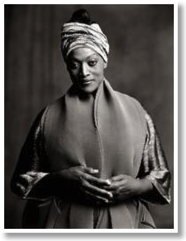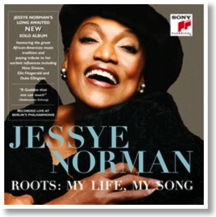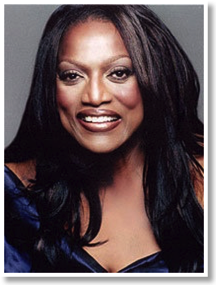For Love of Music
African Americans, opera and classical music all reached a seminal convergence beginning in the 1940s. People such as Leontyne Price, Marian Anderson, Robert McFerrin, George Shirley, Kathleen Battle and Jessye Norman excited audiences with their vocal acrobatics in opera, symphony orchestras and choirs.
 The celebrated Norman, one of the world’s legendary sopranos in opera music, has often been called Maria Callas’ successor and has reaped a myriad of artistic awards and honorary distinctions including the National Medal of Arts, the Kennedy Center Honors, a Lifetime Grammy Achievement award and honorary doctorates from nearly 40 colleges and conservatories from around the world. She has performed in Mozart’s Le nozze di Figaro, Richard Wagner’s Tannhäuser, Giuseppe Verdi’s Aida, Giacomo Meyerbeer’s L’africaine and in oratorios such as Felix Mendelssohn’s Elijah and George Handel’s Deborah, to name a few.
The celebrated Norman, one of the world’s legendary sopranos in opera music, has often been called Maria Callas’ successor and has reaped a myriad of artistic awards and honorary distinctions including the National Medal of Arts, the Kennedy Center Honors, a Lifetime Grammy Achievement award and honorary doctorates from nearly 40 colleges and conservatories from around the world. She has performed in Mozart’s Le nozze di Figaro, Richard Wagner’s Tannhäuser, Giuseppe Verdi’s Aida, Giacomo Meyerbeer’s L’africaine and in oratorios such as Felix Mendelssohn’s Elijah and George Handel’s Deborah, to name a few.
Norman’s voice has graced leading performance venues and events such as the United States’ Carnegie Hall and Germany’s Salzburg Festival, and she has also drawn praise from diverse figures such as former U.S. presidents Ronald Reagan and Bill Clinton, England’s Queen Elizabeth II and more recently U.S. president Barack Obama. From Haydn to Stravinsky, Bartok to Strauss, Beethoven to Debussy, Mahler to Brahms and Ravel to Schubert, Norman’s impeccable voice has graced their works.
 Recorded live in 2009 at Berlin’s prestigious Philharmonic, Norman’s new album, Roots: My Life, My Song, furthers her legacy. Recently, Norman talked about her innovative and illustrious career, her thoughts on music and her new recording.
Recorded live in 2009 at Berlin’s prestigious Philharmonic, Norman’s new album, Roots: My Life, My Song, furthers her legacy. Recently, Norman talked about her innovative and illustrious career, her thoughts on music and her new recording.
Jeff Boyce: Your new recording, Roots: My Life, My Song is a stirring collection of spiritual songs as well as tribute to African Americans and their impact on music. What is one message that you’d like listeners to take with them?
Jessie Norman: The message of this recording for me is that there is a world of music yet to be explored and that it is both a pleasure and a duty to pay homage to those who have gone before me, “Who have opened doors and turned on the lights so that others of us might more easily find our way.” The quote above is taken from a text that I wrote for the opening night of the three-week long, fifty-two-event festival that I had curate for Carnegie Hall in March of 2009, called Honor.
Can you tell us which songs from Roots: My Life, My Song touch you the most?
One of the marvelous things about the world of music is its vastness and its variety. Therefore, one can really choose those compositions that speak to one’s own heart knowing that having made choices in this manner, the performance will speak more readily to them. I love every single note of every song chosen for this recording.
What is it that people should know about your grandmother and mother and their influences when it comes to singing spiritual music?
Surely, as with most people, my home life carried enormous sway over the manner in which I managed the developmental processes early on. And, with such strong, dedicated people in my own family and within our various communities, the singing of music with a message of faith and hope is as natural to me as breathing. My mother and grandmother understood this and indeed, my father, my grandfather…all aunts, uncles, cousins and family friends. This can be music as different as that from Johann Sebastian Bach, or a spiritual created in a wheat field by an enslaved ancestor.
Is all music spiritual for you?
It is my belief that all of art and specifically music when performed, or when enjoyed quietly at home on one’s own, can have a deeply spiritual impact.
Do you have a favorite opera or very much enjoy performing a certain character on stage?
Again, the vastness of the repertoire makes it possible to sing the music of my heart. I sing the opera characters that speak most directly to me, whether this be “the woman” in Schoenberg’s Erwartung, or Dido in Berlioz’ Les Troyens, or the Countessa in Le Nozze Di Figaro…or any others that I sing. I adore them all!
 You have said you have enjoyed the writings of Toni Morrison. What are you reading now? And are you reading any other author currently?
You have said you have enjoyed the writings of Toni Morrison. What are you reading now? And are you reading any other author currently?
Yes, the great Morrison is surely one of my very favorites, but I read a great number of different writers and am being further educated by two other authors at the moment, Peter Rutkoff and William B. Scott. Fly Away. The Great African American Cultural Migrations. And who has not learned more about life than we thought we would ever know from the great Angelou or been taken to another place in the soul with so many authors that we love and admire?
What is one key element that people of the world should know about black contributions to the world of opera and classical music?
This important topic is surely not for a brief interview. Books have been written on the subject (one, as mentioned above) and would take more space in your publication than this interview would provide. The importance of the contribution requires a separate and complete review.
Where do you see African Americans going in the future with opera and classical music?
The answer is truly written in the stars. One can only trust that funding continues and that all those that wish to walk into the light of their ancestors will be offered the opportunity to do so.
 Arts funding has been cut in schools across America. What would you say to people about not cutting these programs and classes so that children and young adults can fully develop?
Arts funding has been cut in schools across America. What would you say to people about not cutting these programs and classes so that children and young adults can fully develop?
Funding for the arts in public school education is the responsibility of those of us who pay taxes to support our school system and who, for too long, have allowed those who are disengaged from the necessity of a complete education of our children to make the curriculum decisions. We know from study, upon study, that education in the arts for our children supports and enhances all of their other studies as they learn through arts training, that they have an inner voice that we wish to hear about which we would like to know. That through repetition, one becomes better at any skill, whether playing the C# minor scale on the piano or learning the capitals of all states in the United States. Self-awareness is a great thing, and the arts are key in bringing this clarity to our young people. We, the supporters of our school systems, are at fault in the demise of arts education. When time allows, do visit the Website jessyenormanschool.org to witness a solution to this problem.
What advice would you like to give to people entering the opera and classical music worlds?
This is in the abstract. Too many parts of decision-making are determined by the individual’s own intentions, wishes, desires, preparedness and determination.
Tell us what the future holds for Jessye Norman?
Yes, I am writing a book.
by Jeff Boyce

Norman’s voice has graced leading performance venues and events such as the United States’ Carnegie Hall and Germany’s Salzburg Festival, and she has also drawn praise from diverse figures such as former U.S. presidents Ronald Reagan and Bill Clinton, England’s Queen Elizabeth II and more recently U.S. president Barack Obama. From Haydn to Stravinsky, Bartok to Strauss, Beethoven to Debussy, Mahler to Brahms and Ravel to Schubert, Norman’s impeccable voice has graced their works.

Jeff Boyce: Your new recording, Roots: My Life, My Song is a stirring collection of spiritual songs as well as tribute to African Americans and their impact on music. What is one message that you’d like listeners to take with them?
Jessie Norman: The message of this recording for me is that there is a world of music yet to be explored and that it is both a pleasure and a duty to pay homage to those who have gone before me, “Who have opened doors and turned on the lights so that others of us might more easily find our way.” The quote above is taken from a text that I wrote for the opening night of the three-week long, fifty-two-event festival that I had curate for Carnegie Hall in March of 2009, called Honor.
Can you tell us which songs from Roots: My Life, My Song touch you the most?
One of the marvelous things about the world of music is its vastness and its variety. Therefore, one can really choose those compositions that speak to one’s own heart knowing that having made choices in this manner, the performance will speak more readily to them. I love every single note of every song chosen for this recording.
What is it that people should know about your grandmother and mother and their influences when it comes to singing spiritual music?
Surely, as with most people, my home life carried enormous sway over the manner in which I managed the developmental processes early on. And, with such strong, dedicated people in my own family and within our various communities, the singing of music with a message of faith and hope is as natural to me as breathing. My mother and grandmother understood this and indeed, my father, my grandfather…all aunts, uncles, cousins and family friends. This can be music as different as that from Johann Sebastian Bach, or a spiritual created in a wheat field by an enslaved ancestor.
Is all music spiritual for you?
It is my belief that all of art and specifically music when performed, or when enjoyed quietly at home on one’s own, can have a deeply spiritual impact.
Do you have a favorite opera or very much enjoy performing a certain character on stage?
Again, the vastness of the repertoire makes it possible to sing the music of my heart. I sing the opera characters that speak most directly to me, whether this be “the woman” in Schoenberg’s Erwartung, or Dido in Berlioz’ Les Troyens, or the Countessa in Le Nozze Di Figaro…or any others that I sing. I adore them all!

Yes, the great Morrison is surely one of my very favorites, but I read a great number of different writers and am being further educated by two other authors at the moment, Peter Rutkoff and William B. Scott. Fly Away. The Great African American Cultural Migrations. And who has not learned more about life than we thought we would ever know from the great Angelou or been taken to another place in the soul with so many authors that we love and admire?
What is one key element that people of the world should know about black contributions to the world of opera and classical music?
This important topic is surely not for a brief interview. Books have been written on the subject (one, as mentioned above) and would take more space in your publication than this interview would provide. The importance of the contribution requires a separate and complete review.
Where do you see African Americans going in the future with opera and classical music?
The answer is truly written in the stars. One can only trust that funding continues and that all those that wish to walk into the light of their ancestors will be offered the opportunity to do so.

Funding for the arts in public school education is the responsibility of those of us who pay taxes to support our school system and who, for too long, have allowed those who are disengaged from the necessity of a complete education of our children to make the curriculum decisions. We know from study, upon study, that education in the arts for our children supports and enhances all of their other studies as they learn through arts training, that they have an inner voice that we wish to hear about which we would like to know. That through repetition, one becomes better at any skill, whether playing the C# minor scale on the piano or learning the capitals of all states in the United States. Self-awareness is a great thing, and the arts are key in bringing this clarity to our young people. We, the supporters of our school systems, are at fault in the demise of arts education. When time allows, do visit the Website jessyenormanschool.org to witness a solution to this problem.
What advice would you like to give to people entering the opera and classical music worlds?
This is in the abstract. Too many parts of decision-making are determined by the individual’s own intentions, wishes, desires, preparedness and determination.
Tell us what the future holds for Jessye Norman?
Yes, I am writing a book.
by Jeff Boyce


